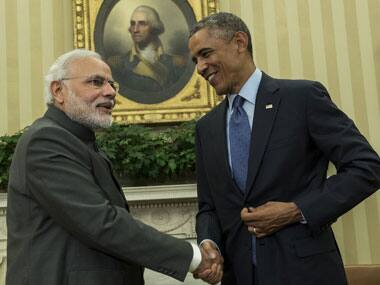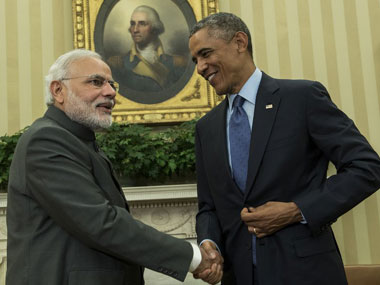Just about two days before United States President Barack Obama’s India visit (25-27 January), here is a bit of bad news about India-US bilateral relations. After hectic efforts to remove glitches in the India-US civilian nuclear agreement and make it fully operational, the two sides have hit a dead-end and their respective positions would remain as deadlocked as ever during Obama’s visit as well. The India-US logjam on the civilian nuclear agreement is allegedly largely because of the “flagging rights” issue raised by the Americans to which the Indians are dead opposed. [caption id=“attachment_2060003” align=“alignleft” width=“380”]  PM Narendra Modi and Barack Obama in a file photo. AFP[/caption] The two sides tried their best to resolve sticky issues in operationalising the nuclear deal and extended their talks in London by one more day. However, at the end of the extended day on Thursday, the two sides’ position on the “flagging rights” issue remained diametrically opposed. At the just-concluded talks in London the Americans have insisted on the issue of tracking and accounting of nuclear material supplied by the US or produced in US-supplied reactors. The controversy is that the Americans have been calling for cobbling up an “administrative arrangement” which would flag and track the whereabouts of US-supplied nuclear materials and without which the Indo-US nuclear agreement cannot be operationalised. Americans say India has to agree to give Washington flagging and tracking rights so that relevant American authorities know the whereabouts of the US-supplied nuclear materials at any given time without which the US Nuclear Regulatory Commission will not be able to issue the licenses needed to go forward with nuclear reactor sales to India. Washington has said it is a routine and standard clause with all its nuclear cooperation partners like Japan and Euratom, and the Indians are in no way being discriminated against. India strongly feels otherwise. New Delhi looks at the flagging and tracking issues as being highly intrusive and has made it clear to the Americans that it will never agree, deal or no deal. India’s argument is that all transaction of all nuclear materials under the Indo-US agreement would be covered by the IAEA safeguards and the assurance of International Atomic Energy Agency (IAEA) should be enough for the Americans. In other words, the Indians are feeling that the Americans are unnecessarily shifting the goal posts and are being too finicky and intrusive. The Indians have told the Americans that the Canadians too mouthed the same condition initially and batted for a similar arrangement that Washington wants from New Delhi. But the Canadians dropped their demand after the Indians told them that once the IAEA gives an assurance that all nuclear material is safe, accounted for and being put to peaceful use, it should be the end of the matter. Besides, India feels that the “administrative arrangement” being talked about by the Americans in flagging and tracking the nuclear materials would result in additional expense and effort which must be avoided. The stand of the Narendra Modi government is that it can never agree to such intrusive arrangements and compromise with secrecy and autonomy of the Indian nuclear programme by giving Americans or anyone else flagging rights to track nuclear materials. The Americans have been told in no uncertain terms that they will have to dilute their stand to find a compromise on this issue. Technical experts from the two sides have returned home to brief their governments about the logjam. It is clear that the two sides will not be able to resolve all outstanding civil nuclear issues when Obama and Prime Minister Narendra Modi hold delegation-level talks on 25 January. However all that the two principals can do now is to instruct their respective governments to find an amicable solution to the vexed issues as quickly as possible. The “Agreement for Cooperation Between the Government of the United States of America and the Government of India Concerning Peaceful Uses of Nuclear Energy”, also known as the 123 Agreement, was seen as the culmination of bilateral relations between the world’s biggest democracies. However, the deal has been hanging fire since the US approved it on 28 September, 2008. It was believed that all glitches in operationalisation of the 123 agreement would have been removed during Obama’s India visit, but this is not going to happen. However, the good news is that the two sides have resolved the liability issues and have agreed to the mechanism of insurance pool. But that is a different story. The writer is Firstpost Consulting Editor and a strategic analyst who tweets @Kishkindha.
Just about two days before United States President Barack Obama’s India visit, here is a bit of bad news about India-US bilateral relations. After hectic efforts to remove glitches in the India-US civilian nuclear agreement and make it fully operational, the two sides have hit a dead-end.
Advertisement
End of Article
Written by Rajeev Sharma
Consulting Editor, Firstpost. Strategic analyst. Political commentator. Twitter handle @Kishkindha. see more


)

)
)
)
)
)
)
)
)



